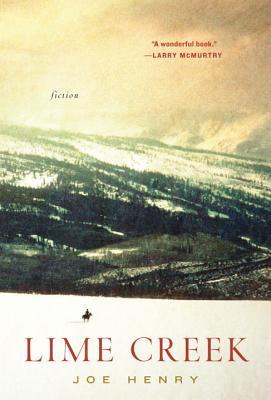
Lime Creek
Fiction
کتاب های مرتبط
- اطلاعات
- نقد و بررسی
- دیدگاه کاربران
نقد و بررسی

February 28, 2011
Songwriter and ex-rancher Henry's slight and earthy debut, a short volume of eight connected stories of the high plains, begins with Spencer Davis, "an interloper in a cowboy hat," who marries Elizabeth Putnam of Cambridge, Mass., and spirits her off to a Wyoming ranch to birth foals, put up the hay, and have kids—Lonny, Luke, and Whitney. In subsequent sketches, Spencer discusses his physical and psychological WWII scars with his three awed sons; Luke has to put down his old mare; and Whitney and Luke star on the high school gridiron. The Davis men prove to be resilient, tough, and stubborn, and also prone to bouts of lyrical fancy such as with Spencer's thoughts of Elizabeth as an "inland sea washing up and falling back and washing up again with the muffled tide-like stroke of her own intimate pulse." It's brooding and deadly serious in the way that fiction of the rustic West often is, but maybe too much so, as the reader is all too aware of what Henry strains for, but doesn't reach: the lean, mournful power of Annie Proulx.

March 1, 2011
An impressionistic portrait of hardscrabble life on a Wyoming ranch.
Henry's debut is a linked story collection centered on the Davis clan, a family of ranchers led by Spencer, a hard-driving patriarch who hasn't shaken off the psychological wounds of World War II. As the book opens, he's a young college student who's just decided to marry his girlfriend, Elizabeth, on the East Coast, but he quickly abandons his Cambridge "book learning" to head back west to handle horses and raise two sons, Luke and Whitney. One of the better pieces, "Tomatoes," describes the two boys as precocious pre-teens, stealing pies and ruining sheets hung out to dry by using them as strike zones for pitched tomatoes. Their inevitable punishment reveals the intense labor the land requires, paralleled by the intensity of Spencer's war memories. As the boys mature, the theme of the danger inherent in daily living intensifies: In "Hands," the men move horses in a painfully bitter winter storm, while the closing "Yet Still of the Heart" adds a tragic note, suggesting just how hard nature pushes back against efforts to control it. Henry is working the same territory as Thomas McGuane, Annie Proulx and Kent Haruf, though his ambitions aren't nearly as broad—the bulk of the eight pieces in this slim book are more like sketches than full-blooded stories, rendering a particular moment instead of cultivating nuanced connections among the family members. (Elizabeth in particular gets short shrift—the implication is that this is stubbornly manly territory.) More frustrating than the slight plots, though, is the derivative, weak prose. Henry works in a deliberately Faulknerian mode, stretching out sentences that routinely reference the inexorability and indomitability of the people, land and animals. But the high-flown language and run-on sentences mostly just swallow up the thin plots Henry has devised, leaving the impression of an author working too hard to give these stories gravitas.
Occasionally affecting moments too often succumb to airy, meandering writing.
(COPYRIGHT (2011) KIRKUS REVIEWS/NIELSEN BUSINESS MEDIA, INC. ALL RIGHTS RESERVED.)

Starred review from March 15, 2011
This first novel from noted lyricist Henry opens with a young man named Spencer gentling a two-year-old bay colt, watched closely by the woman he'll eventually marry. It ends powerfully with Spencer's son showing his stuff when he's caught in a blizzard and must recapture a horse that has fled the barn, spooked by sliding snow. In between, told in heart-wrenchingly beautiful prose, we find the story of a Wyoming ranch family sometime in the 20th century. We see Spencer, out east at Harvard, diffidently wooing and eventually bringing home the sweetheart whose family summered in Wyoming. We see Spencer's twin boys getting into serious mischief with a bunch of tomatoes. We see a lovingly described Christmas celebration in a barn and the struggle to save cattle as the terrible snows come, with Spencer uncharacteristically caustic as he tells his queasy children about a much darker, colder, and scarier time he spent in the army. And in the end, unfolding in discrete and carefully observed chapters, we have the whole picture of these touching, hard-earned lives. VERDICT Brief but brilliant in the spirit of Paul Harding's Tinkers, this remarkable work is highly recommended.--Barbara Hoffert, Library Journal
Copyright 2011 Library Journal, LLC Used with permission.

























دیدگاه کاربران